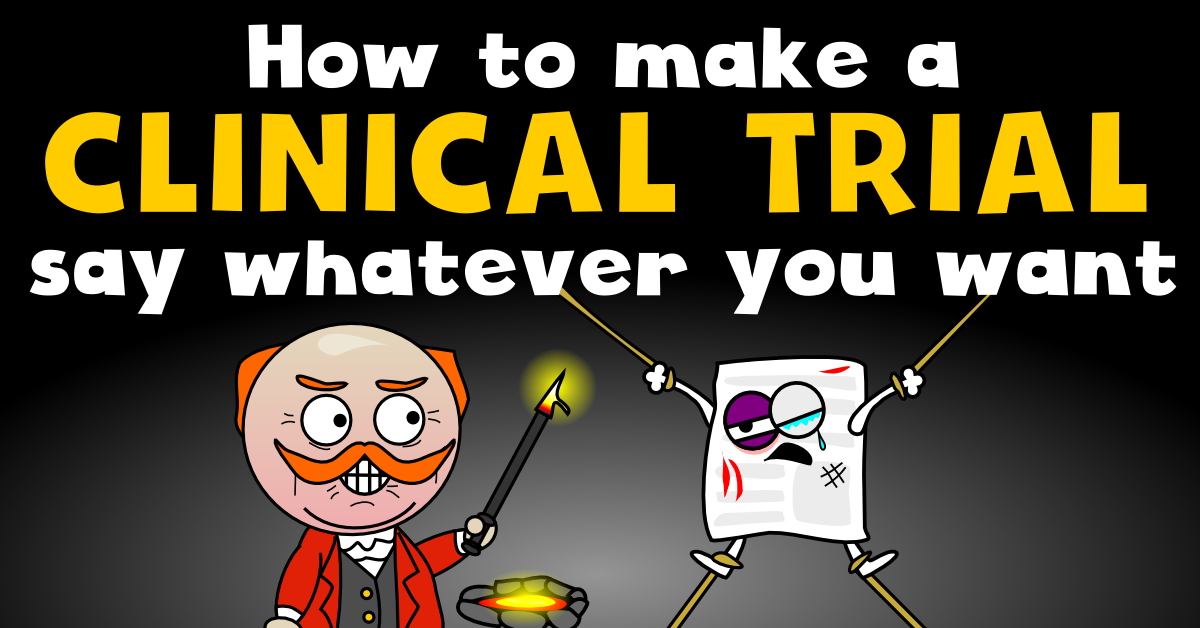Are you under the impression that clinical trials are constantly saying the opposite from one another?
That, mysteriously, new trials with awesome results appear every 30 seconds?
That you can always find that one trial that will prove your point?
That big companies manipulate data?
That shady websites only cite the conclusions that are good for them?
If so, you’re not wrong… and it’s super easy to do, by the way.
Here’s a guide on how to make a clinical trial say whatever you want it to say!
Translation by Gabrielle Larocque.
























Great! Wonderful!
Painfully true!
[…] klausimas – ar tiriamieji buvo žmonės. Žiniasklaidoje dažnai „pamirštama“ paminėti, kad tyrimas atliktas su pelėmis arba […]
Food (read: dairy, egg, meat, fisheries) industries` partnership with universities and « health promoting » organizations is a silenced topic – at least in Finland. You´re labelled as a fraud the minute you try to bring up this issue.
It happens here too! Maybe not as much, but it does.
Thanks for your comment!
Olivier
Thank you for your response. What can be done to this issue? Very few collegues are interested about the bisnes behind studies. None of professional magazines neither newspapers publish anything about this, on the contrary, there is a of « media education » how to recognize and ignore « conspiracy theorists ». People suffer and die for vain (well, for profits…). Some willingly, but children don’t have a choice.
I so wish that endothelial glycocalyx and it’s funktion would be taught in preliminary school already. In Finland most M.D.s are ignorant about it, even.
I appreciate your work greatly.
These are tough issues to address, but many solutions have been proposed.
– Regarding the reproducibility crisis, there are initiatives like UK’s AllTrials, which aim to ensure that all clinical trials are published (we know that about 50% never are, whoever they originate from):
https://www.alltrials.net/
– We also need stronger regulations around clinical trial registries (ex. https://www.clinicaltrials.gov/). There is some research showing that even though companies are « supposed » to published and follow trial protocol in these registers, many don’t. Or, they publish the protocol and change it afterwards. This could help prevent issues in research ethics like p-hacking and HARKing.
– Speaking of p-values, many scientists believe they should be made more stringent, like 0.01 or even less, instead of the common 0.05. Other scientists say we should eliminate p-values altogether, and only use indicators of effect size, like NNTs and such.
– Universities should monitor whether their researchers publish in predatory journals, i.e. pay-to-publish journals with poor or nonexistent peer-review.
These are some of the big ideas but there are many others! I suggest reading Ben Goldacre’s « Bad Pharma » for more. Also, Steven Novella regularly addresses these issues on his blog NeuroLogica (https://theness.com/neurologicablog/) and on Science-Based Medicine, like here:
https://sciencebasedmedicine.org/reproducibility-follow-up/
Thanks again for the interesting discussion Soili!
Olivier